Transcription of IMPLEMENTATION GUIDE FOR THE IMPLEMENTATION OF …
1 IMPLEMENTATION GUIDE FOR THE IMPLEMENTATION OF THE AMENDMENTS TO THE national environmental management : WASTE ACT, 2008 (ACT NO. 59 OF 2008) BY THE national environmental management : WASTE AMENDMENT ACT, 2014 (ACT NO. 26 OF 2014) AND THE national environmental management LAWS AMENDMENT ACT, 2014 (ACT NO. 25 OF 2014) JUNE 2015 1 TABLE OF CONTENTS CONTENT PAGE 1. PREAMBLE 2 2. INTRODUCTION 3 3. DEFINITIONS 5 4. APPLICATION OF THE WASTE ACT TO RESIDUE DEPOSITS AND RESIDUE STOCKPILES AND ANIMAL CARCASSES 10 5. APPLICATION OF SCHEDULE 3 - (SECTION 18 OF THE ACT) 11 2 1. PREAMBLE South Africa s commitment to sustainable development is aimed at balancing the broader economic and social developmental needs with the protection of the environmental resources.
2 For the waste sector in South Africa, this means care must be taken to ensure wise consumption and production patterns, resource efficiency, waste prevention and minimization and waste reuse and recovery. Following on the Constitution of the Republic of South Africa, the national environmental management : Waste Act, 2008 (Act No. 59 of 2008) (NEMWA) regulates waste management in order to protect health and the environment by providing reasonable measures for the prevention of pollution and ecological degradation and for securing ecologically sustainable development. Since 2009, certain IMPLEMENTATION challenges with respect to some provisions of the NEMWA were identified by the Department and stakeholders. These relate to: regulatory certainty, institutional IMPLEMENTATION capacity, interpretation, and administration.
3 The waste sector has been identified as having significant potential for job creation and contributing to the macro economy of South Africa and other countries in the region. Transitioning to a RECYCLING ECONOMY, has sound economic and social justification. This transition would involve levelling the playing field for greener products by reforming policies and developing incentives, strengthening market infrastructure, redirecting public investment, greening public procurement and improving institutional and IMPLEMENTATION capacity. During the public hearings on the national environmental management : Waste Amendment Bill, the then Portfolio Committee on Water and environmental Affairs identified the different interpretations that exist in relation to the definition of the waste as one of the main stumbling blocks in the effective IMPLEMENTATION of the NEMWA.
4 Parliament effected amendments with the intention to remove the ambiguity and provides for a list of categories of wastes as a new Schedule 3. The Minister will be able to define new wastes by notice in the Gazette or exclude wastes in a prescribed manner. It provides for an enabling mechanism for the re-use, recycling and recovery of waste streams in order to promote the recycling economy within a legal framework for the end of waste. The Department through a stakeholder iterative process developed the Amendments to the NEMWA in line with the IMPLEMENTATION challenges that have been identified. The Portfolio Committee considered 3 the national environmental management : Waste Amendment Bill, 2013 [B32 of 2013] (Waste Amendment Bill), consulted the public and after the consultation process, further amendments were made to the Bill.
5 Although the national Council of Provinces consulted on the Waste Amendment Bill, no further amendments were made during that process. The national environmental management : Waste Amendment Act, 2014 (Act No. 26 of 2014) (Waste Amendment Act) was subsequently published on 2 June 2014 and entered into force immediately on date of publication. 2. INTRODUCTION The Waste Amendment Act entered into force on 2 June 2014. The national environmental management Laws Amendment Act, 2014 (Act No. 25 of 2014) (NEMLA 3) entered into force on 3 September 2014, specifically insofar as residue deposits and residue stockpiles are concerned. The purpose of this document is to provide a guideline to the public on how the Department of environmental Affairs will interpret and implement Waste Amendment Act and NEMLA 3 as far as the last-mentioned Act deals with waste issues.
6 As these Acts are implemented and as new issues emerge, the Department will provide further guidance and add to the document. The definition of by-product that was linked to the definition of waste, and previously created interpretation difficulties was deleted. This has now been resolved by providing a more comprehensive definition of waste. The intention with the new definition of waste is to provide for more clarity and certainty and less ambiguity in interpretation. The definitions of building and demolition waste , business waste , domestic waste , general waste , hazardous waste , inert waste , residue deposits and residue stockpiles were moved to the new Schedule 3. The reason for this is to have the definitions and the waste types in one place to provide for the ease of reading.
7 The definitions form an integral part of the waste definition and will in effect still apply to the whole Act. The general rule is that a schedule which expounds sections of an Act has the same force of law as the section in the main Act. The abovementioned Amendment Acts do not apply retrospectively. Section 12 of the Interpretation Act regulates the effect of repealed law and stipulates as follows: 4 (1) Where a law repeals and re-enacts with or without modifications, any provision of a former law, references in any other law to the provision so repealed shall, unless the contrary intention appears, be construed as references to the provision so re-enacted. (2) Where a law repeals any other law, then unless the contrary intention appears, the repeal shall not - (a) revive anything not in force or existing at the time at which the repeal takes effect; or (b) affect the previous operation of any law so repealed or anything duly done or suffered under the law so repealed; or (c) affect any right, privilege, obligation or liability acquired, accrued or incurred under any law so repealed; or (d) affect any penalty, forfeiture or punishment incurred in respect of any offence committed against any law so repealed.
8 Or (e) affect any investigation, legal proceeding or remedy in respect of any such right, privilege, obligation, liability, forfeiture or punishment as is in this subsection mentioned, and any such investigation, legal proceeding or remedy may be instituted, continued or enforced, and any such penalty, forfeiture or punishment may be imposed, as if the repealing law had not been passed. When compiling this document the Department based it views on the premise that our law supports the principle of effectual and purposeful legislation. In other words, unless the contrary is clear, it is presumed that the legislature does not intend legislation which is futile and nugatory. The document will be published on and 5 3. DEFINITIONS- Definition: Recovery is the controlled extraction or retrieval of any substance, material or object from waste.
9 Interpretation: The recovering of energy has been removed from the definition, as the national environmental management : Waste Act, 2008 is not primarily concerned with the recovery of energy per se, but is it concerned with the management and handling of waste (the fuel ), which is an input into the energy generating process or co-generation process. Only when the activities in question are listed under sections 24(2) and 24D of the national environmental management Act, 1998 (Act No. 107 of 1998) ( Listing Notice 1, 2 or 3 published by Government Notice R983, R984 or R985, respectively, in Government Gazette 38282 of 4 December 2014 as amended), section 21(1)(b) of the national environmental management : Air Quality Act, 2004 (Act No.)
10 39 of 2004) ( activities published under Government Notice 893 in Government Gazette 37054 of 22 November 2013 as amended), section 19(2) of the NEMWA ( Notice No. 921 in Government Gazette 37083 of 29 November 2013 as amended) a waste management licence, an environmental authorisation or an atmospheric emission licence are required or specific norms and standards need to be adhered to. Definition: re-use' means to utilise the whole, a portion of or specific part of any substance, material or object from the waste stream for a similar or different purpose without changing the form or properties of such substance, material or object; . Interpretation: The definition is clear. No explanation is required. 6 Definition: 'waste' means (a) any substance, material or object, that is unwanted, rejected, abandoned, discarded or disposed of, or that is intended or required to be discarded or disposed of, by the holder of that substance, material or object, whether or not such substance, material or object can be re-used, recycled or recovered and includes all wastes as defined in Schedule 3 to this Act.


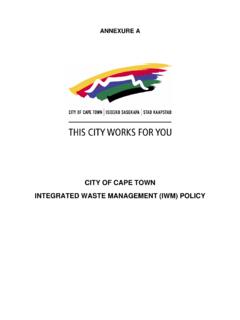




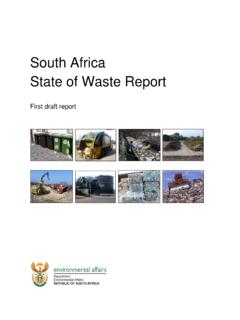
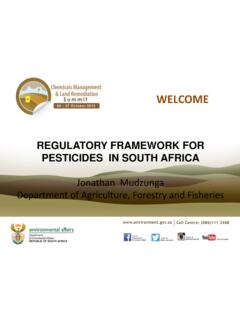

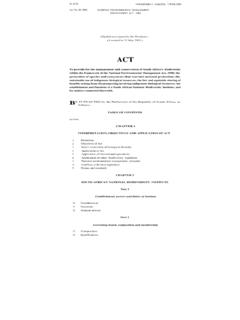

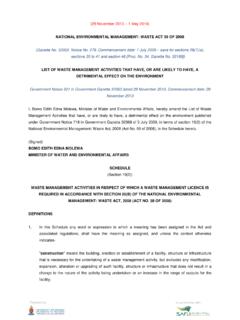


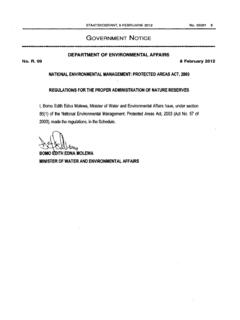
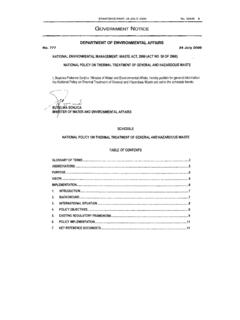

![National Environmental Management Act [No. 107 of 1998]](/cache/preview/3/8/3/c/e/f/0/e/thumb-383cef0e6349dc46a88a24f7331b59ae.jpg)